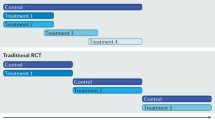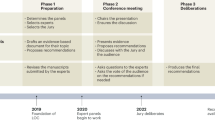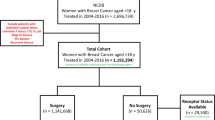Abstract
Conducting high-quality prospective clinical trials in surgical oncology remains a challenge, and many seemingly well-designed trials lack this high quality because of inadequate recruitment accrual, lack of clinician interest, or evolution of treatment strategy during the many years over which such trials are conducted. In this Perspectives we examine some of the failures in published surgical oncology trials and discuss why they failed, and we make a critical assessment of the established prospective trial methodology in oncological practice (that is, phase 0, I, II, III and IV trials, and large prospective comparative audits) and how these methods might be used more effectively in future evaluation of cancer-surgery practice.
This is a preview of subscription content, access via your institution
Access options
Subscribe to this journal
Receive 12 print issues and online access
$209.00 per year
only $17.42 per issue
Buy this article
- Purchase on Springer Link
- Instant access to full article PDF
Prices may be subject to local taxes which are calculated during checkout
Similar content being viewed by others
Change history
18 December 2015
The references cited in this article were incorrect. This error has now been corrected for the print and online versions of the article.
References
Wyld, L., Audisio, R. A. & Poston, G. J. The evolution of cancer surgery and future perspectives. Nat. Rev. Clin. Oncol. 12, 115–124 (2015).
Poston, G. J. in Textbook of Surgical Oncology (eds Poston, G. J., Beauchamp, R. D. & Ruers, T.) 1–4 (Informa Healthcare, 2007).
Philip, J. F. Results of treatment of breast cancer at Aberdeen Royal Infirmary 1940–55. Br. Med. J. 1, 323–331 (1967).
Cancer Research UK. Cancer Statistics, Key Facts: All Cancers Combined, February 2015 [online], (2015).
McCulloch, P., Taylor, I., Sasako, M., Lovett, B. & Griffin, D. Randomised trials in surgery: problems and possible solutions. BMJ 324, 1448–1451 (2002).
Ergina, P. L. et al. Challenges in evaluating surgical innovation. Lancet 374, 1097–1104 (2009).
Balch, C. M., Durant, J. R. & Bartolucci, A. A. The impact of surgical quality control in multi-institutional group trials involving adjuvant cancer treatments. Ann. Surg. 198, 164–167 (1983).
[No authors listed] Surgical research: the reality and the IDEAL. Lancet 374, 1037 (2009).
McCulloch, P. et al. No surgical innovation without evaluation: the IDEAL recommendations. Lancet 374, 1105–1112 (2009).
Solomon, M. J. & McLeod, R. S. Clinical studies in surgical journals—have we improved? Dis. Colon Rectum 36, 43–48 (1993).
Weil, R. J. The future of surgical research. PLoS Med. 1, e13 (2004).
Panesar, S. S., Thakrar, R., Athanasiou, T. & Sheikh, A. Comparison of reports of randomized controlled trials and systematic reviews in surgical journals: literature review. J. R. Soc. Med. 99, 470–472 (2006).
Martling, A., Cedermark, B., Johansson, H., Rutqvist, L. E. & Holm, T. The surgeon as a prognostic factor after the introduction of total mesorectal excision in the treatment of rectal cancer. Br. J. Surg. 89, 1008–1013 (2002).
McArdle, C. S. & Hole, D. Impact of variability among surgeons on postoperative morbidity and mortality and ultimate survival. BMJ 302, 1501–1505 (1991).
Farrokhyar, F. et al. Randomized controlled trials of surgical interventions. Ann. Surg. 251, 409–416 (2010).
Bonenkamp, J. J. et al. Extended lymph-node dissection for gastric cancer. N. Engl. J. Med. 340, 908–914 (1999).
Songun, I., Putter, H., Kranenbarg, E. M., Sasako, M. & van de Velde, C. J. Surgical treatment of gastric cancer: 15-year follow-up results of the randomised nationwide Dutch D1D2 trial. Lancet Oncol. 11, 439–49 (2010).
Macdonald, J. S. et al. Chemoradiotherapy after surgery compared with surgery alone for adenocarcinoma of the stomach or gastroesophageal junction. N. Engl. J. Med. 345, 725–730 (2001).
Abraham, I., Dhar, P. & Praseedom, R. K. Adjuvant chemoradiotherapy for gastric cancer. N. Engl. J. Med. 346, 210–211 (2002).
Cuschieri, A. Does chemoradiotherapy after intended curative surgery increase survival of gastric cancer patients? Gut 50, 751 (2002).
Chapman, S. J. et al. Discontinuation and non-publication of surgical randomised controlled trials: observational study. BMJ 349, g6870 (2014).
Denost, Q. et al. Perineal transanal approach: a new standard for laparoscopic sphincter-saving resection in low rectal cancer, a randomized trial. Ann. Surg. 260, 993–999 (2014).
Ruers, T. et al. Radiofrequency ablation combined with systemic treatment versus systemic treatment alone in patients with non-resectable colorectal liver metastases: a randomized EORTC Intergroup phase II study (EORTC 40004). Ann. Oncol. 23, 2619–2626 (2012).
Ruers, T. et al. Radiofrequency ablation (RFA) combined with chemotherapy for unresectable colorectal liver metastases (CRC LM): long-term survival results of a randomized phase II study of the EORTC-NCRI CCSG-ALM Intergroup 40004 (CLOCC) [abstract]. J. Clin. Oncol. 33 (Suppl.), a3501 (2015).
Lamont, E. B. et al. Is patient travel distance associated with survival on phase II clinical trials in oncology? J. Natl Cancer Inst. 95, 1370–1375 (2003).
Pugh, S. A. et al. Site and stage of colorectal cancer influence the likelihood and distribution of disease recurrence and postrecurrence survival: data from the FACS randomized controlled trial. Ann. Surg. http://dx.doi.org/10.1097/SLA.0000000000001351 (2015).
Olson, J. A. Jr et al. American College of Surgeons Oncology Group Trials Z0010 and Z0011. Impact of immediate versus delayed axillary node dissection on surgical outcomes in breast cancer patients with positive sentinel nodes: results from American College of Surgeons Oncology Group Trials Z0010 and Z0011. J. Clin. Oncol. 26, 3530–3535 (2008).
Caudle, A. S. et al. Multidisciplinary considerations in the implementation of the findings from the American College of Surgeons Oncology Group (ACOSOG) Z0011 study: a practice-changing trial. Ann. Surg. Oncol. 18, 2407–2412 (2011).
Caudle, A. S. et al. American College of Surgeons Oncology Group (ACOSOG) Z0011: impact on surgeon practice patterns. Ann. Surg. Oncol. 19, 3144–3151 (2012).
Alliance for Clinical Trials in Oncology. Our vision [online], (2015).
American College of Surgeons Oncology Group and Radiation Therapy Oncology Group: ACOSOG Z4099/ RTOG 1021. A randomized phase III study of sublobar resection (+/−brachytherapy) versus stereotactic body radiation therapy in high risk patients with stage I non-small cell lung cancer (NSCLC) http://atc.wustl.edu/protocols/rtog/1021/Z4099-1021_A0_05-02-2011 (2011)
Alliance for Clinical Trials in Oncology. Alliance study result summaries [online], (2015).
European Organisation for Research and Treatment of Cancer. Clinical Trials Database [online], (2015).
Jacquier, I., Boutron, I., Moher, D., Roy, C. & Ravaud, P. The reporting of randomized clinical trials using a surgical intervention is in need of immediate improvement: a systematic review. Ann. Surg. 244, 677–683 (2006).
National Institute for Health and Care Excellence. NICE technology appraisal guidance [TA176]: Cetuximab for the first-line treatment of metastatic colorectal cancer [online]
Naredi, P. & La Quaglia, P. The future of trials in surgical oncology. Nat. Rev. Clin. Oncol. 12, 425–431 (2015).
[No authors listed] The periodic health examination. Canadian Task Force on the Periodic Health Examination. Can. Med. Assoc. J. 121, 1193–1254 (1979).
Sackett, D. L. Rules of evidence and clinical recommendations on the use of antithrombotic agents. Chest 95 (2 Suppl.), 2S–4S (1989).
Adam, R. et al. Patients with initially unresectable colorectal liver metastases: is there a possibility of cure? J. Clin. Oncol. 27, 1829–1835 (2009).
Brouquet, A. et al. High survival rate after two-stage resection of advanced colorectal liver metastases: response-based selection and complete resection define outcome. J. Clin. Oncol. 29, 1083–1090 (2011).
Elias, D. et al. Peritoneal colorectal carcinomatosis treated with surgery and perioperative intraperitoneal chemotherapy: retrospective analysis of 523 patients from a multicentric French study. J. Clin. Oncol. 28, 63–68 (2010).
Curley, S. A. Radiofrequency ablation versus resection for resectable colorectal liver metastases: time for a randomized trial? Ann. Surg. Oncol. 15, 11–13 (2008).
Barkun, J. S. et al. Evaluation and stages of surgical innovations. Lancet 374, 1089–1096 (2009).
Köckerling, F. The need for registries in the early scientific evaluation of surgical innovations. Front. Surg. 1, 12 (2014).
Schadde, E. et al. Early survival and safety of ALPPS: first report of the International ALPPS Registry. Ann. Surg. 260, 829–836 (2014).
Boden, W. E., O'Rourke, R. A., Teo, K. K., Hartigan, P. M. & Maron, D. J. Optimal medical therapy with or without PCI for stable coronary disease. N. Engl. J. Med. 356, 1503–1516 (2007).
Benson, K. & Hartz, A. J. A comparison of observational studies and randomized, controlled trials. N. Engl. J. Med. 342, 1878–1886 (2000).
Concato, J., Shah, N. & Horwitz, R. I. Randomized, controlled trials, observational studies, and the hierarchy of research designs. N. Engl. J. Med. 342, 1887–1892 (2000).
[No authors listed] Quality assurance in surgical oncology: the EURECCA polatform. Eur. J. Surg. Oncol. 40, 1387–1390 (2014).
Moher, D. et al. CONSORT 2010 explanation and elaboration: updated guidelines for reporting parallel group randomised trials. Int. J. Surg. 10, 28–55 (2012).
Moher, D. CONSORT: an evolving tool to help improve the quality of reports of randomized controlled trials. Consolidated Standards of Reporting Trials. JAMA 279, 1489–1491 (1998).
Boutron, I., Moher, D., Altman, D. G., Schulz, K. F. & Ravaud, P. Extending the CONSORT statement to randomized trials of nonpharmacologic treatment: explanation and elaboration. Ann. Intern. Med. 148, 295–309 (2008).
Nagendran, M. et al. Poor adherence of randomised trials in surgery to CONSORT guidelines for non-pharmacological treatments (NPT): a cross-sectional study. BMJ Open 3, e003898 (2013).
Clavien, P. A. & Lillemoe, K. D. A new policy to implement CONSORT guidelines for surgical randomized controlled trials. Ann. Surg. 260, 947–948 (2014).
Lacy, A. M. et al. Laparoscopy-assisted colectomy versus open colectomy for treatment of non-metastatic colon cancer: a randomised trial. Lancet 359, 2224–2229 (2002).
Evrard, S., Mathoulin-Pelissier, S. & Kramar, A. Open versus laparoscopy-assisted colectomy. Lancet 361, 73–76 (2003).
Buunen, M. et al. Survival after laparoscopic surgery versus open surgery for colon cancer: long-term outcome of a randomised clinical trial. Lancet Oncol. 10, 44–52 (2009).
Kitchener, H., Swart, A. M., Qian, Q., Amos, C. & Parmar, M. K. Efficacy of systematic pelvic lymphadenectomy in endometrial cancer (MRC ASTEC trial): a randomised study. Lancet 373, 125–136 (2009).
Barton, D. P., Naik, R. & Herod, J. Efficacy of systematic pelvic lymphadenectomy in endometrial cancer (MRC ASTEC trial): a randomized study. Int. J. Gynecol. Cancer 19, 1465 (2009).
Nordlinger, B., Poston, G. J. & Goldberg, R. M. Should the results of the New EPOC trial change practice in the management of patients with resectable metastatic colorectal cancer confined to the liver? J. Clin. Oncol. 33, 241–243 (2015).
Primrose, J. et al. Systemic chemotherapy with or without cetuximab in patients with resectable colorectal liver metastases: the New EPOC randomised controlled trial. Lancet Oncol. 15, 601–611 (2014).
Evrard, S. et al. Unresectable colorectal cancer liver metastases treated by intraoperative radiofrequency ablation with or without resection. Br. J. Surg. 99, 558–565 (2012).
McCulloch, P. et al. IDEAL framework for surgical innovation 1: the idea and development stages. BMJ 346, f3012 (2013).
Simon R. Optimal two-stage designs for phase II clinical trials. Control. Clin. Trials 10, 1–10 (1989).
US National Library of Medicine. ClinicalTrials.gov [online], (2015).
US National Library of Medicine. ClinicalTrials.gov [online], (2015).
[No authors listed] Improved survival with preoperative radiotherapy in resectable rectal cancer. Swedish Rectal Cancer Trial. N. Engl. J. Med. 336, 980–987 (1997).
Peeters, K. C. et al. The TME trial after a median follow-up of 6 years: increased local control but no survival benefit in irradiated patients with resectable rectal carcinoma. Ann. Surg. 246, 693–701 (2007).
den Dulk, M. et al. The abdominoperineal resection itself is associated with an adverse outcome: the European experience based on a pooled analysis of five European randomised clinical trials on rectal cancer. Eur. J. Cancer 45, 1175–1183 (2009).
Nordlinger, B. et al. Perioperative chemotherapy with FOLFOX4 and surgery for resectable liver metastases from colorectal cancer. Lancet 371, 1007–1016 (2008).
Kapiteijn, E. et al. Preoperative radiotherapy combined with total mesorectal excision for resectable rectal cancer. N. Engl. J. Med. 345, 638–646 (2001).
van Gijn, W. et al. Volume and outcome in colorectal cancer surgery. Eur. J. Surg. Oncol. 36 (Suppl. 1), S55–S63 (2010).
den Dulk, M. et al. Improved overall survival for patients with rectal cancer since 1990: the effects of TME surgery and pre-operative radiotherapy. Eur. J. Cancer 44, 1710–1716 (2008).
Krijnen P, den Dulk, M., Meershoek-Klein-Kranenbarg, E., Jansen-Landheer, M. L. & van de Velde, C. J. Improved survival after resectable non-cardia gastric cancer in The Netherlands: the importance of surgical training and quality control. Eur. J. Surg. Oncol. 35, 715–720 (2009).
West, N. P. et al. Pathology grading of colon cancer surgical resection and its association with survival: a retrospective observational study. Lancet Oncol. 9, 857–865 (2008).
Quirke, P. et al. Effect of the plane of surgery achieved on local recurrence in patients with operable rectal cancer: a prospective study using data from the MRC CR07 and NCIC-CTG CO16 randomised clinical trial. Lancet 373, 821–828 (2009).
Taylor, F. G. et al. Preoperative magnetic resonance imaging assessment of circumferential resection margin predicts disease-free survival and local recurrence: 5-year follow-up results of the MERCURY study. J. Clin. Oncol. 32, 34–43 (2014).
Author information
Authors and Affiliations
Contributions
S.E., P.M.-S., and G.P. researched the data for the article. All authors made substantial contributions to discussions of content. G.P. wrote the article and all authors reviewed/edited the manuscript before submission.
Corresponding author
Ethics declarations
Competing interests
The authors declare no competing financial interests.
Rights and permissions
About this article
Cite this article
Evrard, S., McKelvie-Sebileau, P., van de Velde, C. et al. What can we learn from oncology surgical trials?. Nat Rev Clin Oncol 13, 55–62 (2016). https://doi.org/10.1038/nrclinonc.2015.176
Published:
Issue Date:
DOI: https://doi.org/10.1038/nrclinonc.2015.176
This article is cited by
-
Trends in otolaryngology publications: A 9-year bibliometric analysis of articles published in Journal of Otolaryngology—Head and Neck Surgery
Journal of Otolaryngology - Head & Neck Surgery (2023)
-
Reporting quality of surgical randomised controlled trials in head and neck cancer: a systematic review
European Archives of Oto-Rhino-Laryngology (2021)
-
Big Data vs. Clinical Trials in HPB Surgery
Journal of Gastrointestinal Surgery (2020)
-
Impact of mesenteric defect closure technique on complications after gastric bypass
Langenbeck's Archives of Surgery (2018)
-
Trends in Surgical Research in Head and Neck Cancer
Current Treatment Options in Oncology (2017)



